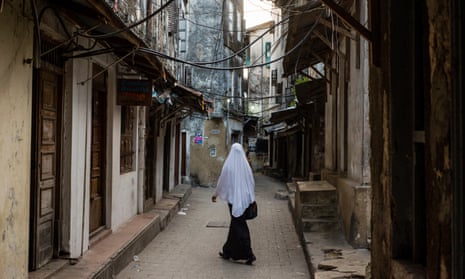Wandering the maze-like streets of Zanzibar’s Stone Town, it’s easy to get lost and stumble into one of the city’s many courtyards. Here, a social buzz breaks the quiet: men sit on low stone benches, or baraza, which are carved into the sides of many houses, and fan themselves and chat; at night, the courtyards come alive with men laughing in the balmy night air, drinking cups of masala tea and watching football on fuzzy televisions, as hawkers sell juicy skewers of spiced meat. And yet, amid all the liveliness, there is just one thing missing. Women.
Zanzibar is 99% Muslim, and women and men in Stone Town have traditionally occupied separate spaces. Older women remember the days before tourism began to flourish, when there were all-female beaches and parks for local women. Near the coast, the Old Fort, built by the Omani empire when they expelled the Portuguese in 1699, used to belong to women.

But today, instead of women gathering to socialise and share problems, the grassy gardens of the Old Fort are filled with vendors hawking tourist trinkets. Across the city, economic development , led by tourism, has usurped the spaces where women once gathered.
Munira Said, the coordinator for Reclaim Women’s Space, cites a variety of factors behind the retreat of women from the public sphere: a growing population, globalisation and immigration. “The space for economic activities overtook the needs of the women.”
Reclaim Women’s Space is working to change that. Employing female engineers and conservators, the project aims to study public spaces, take back those that have been overrun, and create entirely new ones. It is attempting to physically alter Stone Town to give the city’s women a place to gather, and to empower them to work together.

Public space that caters to women enriches their experience by allowing them to encounter different perspectives, says Madina Haji, one of the engineers involved in Reclaim Women’s Space. “If you go outside, you see a lot of things. You can open your mind. You can learn something,” she says. “You can make a friend. And a friend can help you just by sharing the idea … Alone, you have only one mind.”
One of the first places the project created was a community centre near the Old Fort. A small house became a meeting place where women could socialise, gain skills and to discuss what changes might help improve their access to public space.
The project draws on recollections of those older generations, using a technique called memory mapping. Women recall and then draw memories of their favourite places in Stone Town, past and present. Then they imagine the spaces they want for the future. The process has allowed the organisation to create and preserve records of womens’ spaces, while also connecting women from different generations. “We thought the best approach for the women, especially women in Zanzibar who like to tell stories, would be by telling their stories,” says Said. “But not just telling stories: telling stories to empower them.”

Reclaim Women’s Space also runs skill classes, from crafting to stonemasonry and how to run a small business. One exercise takes women around town to look at shops, asking participants what businesses catches their eye, what they might be interested in pursuing, and how they would innovate on the male-dominated squares, given the chance.
Haji and her team of engineers are also working to physically create new spaces that welcome women, particularly those with families. “We can’t force, but we produce room,” Haji says. That “room” is something many of us take for granted: playgrounds.
“It’s rare to see the men take the kids and go to those places,” says Haji. “It’s mostly women ... the kids play, and the women sit and they talk and they eat.”

Parks where women can simultaneously take care of their children and socialise are crucial in Stone Town, Said says. She explains that even as women have gained more education, and started to work more, they remain in charge of household duties.
“Women have to go work, while at the same time they are still responsible for their homes,” she says. “Whereas the men, they will go to work and after that they have time for social gatherings.”
Spaces in which women can socialise and swap ideas may sound insignificant. But in a country in which only 16% of women have a bank account, nearly 22% are married before the age of 18 and women face many other legal, financial and institutional obstacles they are a crucial first step in allowing women to take their place economically, socially and politically.
“We want to empower women to stand on their own,” says Haji. “Maybe we can have a president called Aisha one day.”
Follow Guardian Cities on Twitter, Facebook and Instagram to join the discussion, and explore our archive here
